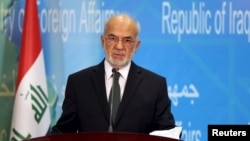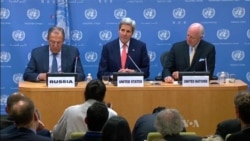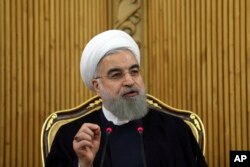Iraq's foreign minister offered Wednesday to act as a mediator between its neighbors Iran and Saudi Arabia.
Those relations became further strained in the past week with the Saudi execution of a prominent Shi'ite cleric, angry protesters storming the Saudi embassy in Tehran and Saudi Arabia's subsequent decision to cut off diplomatic ties with Iran.
Iraqi Foreign Minister Ibrahim al-Jaafari said during a joint news conference with his Iranian counterpart Mohammad Javad Zarif that Iraq's placement in the region brings a role in alleviating the tensions.
WATCH: Related report by Pamela Dockins
Russia proposes mediation
Russia has also offered to act as a mediator, and U.S. Secretary of State John Kerry has been speaking with both Zarif and Saudi Foreign Minister Adel al-Jubeir.
U.S. State Department spokesman John Kirby said Tuesday that Kerry talked by phone with multiple Iranian and Saudi leaders to try to "restore some sense of calm," urge them to use dialogue and keep in mind there are other pressing issues in the region, including the situations in Syria and Yemen.
"These are sovereign decisions. Countries get to decide for themselves who they're going to talk to and who they're not going to talk to," Kirby said.
"We just think that at this particular time, with all the other issues going on and the progress that we have made, not just against [Islamic State], but towards a political process in Syria, that it would be detrimental to regional stability if they decide -- if the decisions that they make are to disengage and to shut down avenues for conversation and dialogue."
Zarif added to Iranian criticism of Saudi Arabia at Wednesday's news conference, saying the Saudi government needs to stop "provoking tension."
Rouhani's comments
Iranian President Hassan Rouhani tweeted Wednesday that the "Attack on Saudi missions was wrong and against the law." But, he continued, saying that Saudi Arabia was using this an an "excuse to cut ties with Iran and encourage others to do the same."
As if on cue, Djibouti cut ties with Iran Wednesday, joining several Arab nations that have also severed diplomatic relations in solidarity with Saudi Arabia. Eritrea also condemed the storming of the Saudi embassy in Tehran.
Rouhani on Tuesday said that Saudi Arabia cannot use severing diplomatic ties with Iran to "hide its crime" of executing cleric Nimr al-Nimr, who was critical of the Riyadh kingdom.
The Arab League is due to discuss the situation at a special meeting requested by Saudi Arabia on Sunday. In addition to Saudi Arabia, several other Arab League members have already taken diplomatic action against Iran. Bahrain and Sudan cut their ties, while the United Arab Emirates downgraded its relations and Kuwait recalled its ambassador to Tehran.
The United Nations Security Council issued a statement Monday condemning the attack on the Saudi embassy. It called on Iran to respect its international obligations to protect diplomatic property and urged all parties to "maintain dialogue and take steps to reduce tensions in the region."







